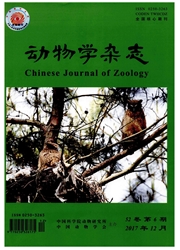

 中文摘要:
中文摘要:
中缅树鼠句(Tupaia befangeri)为东洋界特有小型哺乳动物。本研究测定了中缅树鼠句冷驯化实验组(7d、14d、21d、28d)与对照组(0d)中肝线粒体蛋白含量、呼吸状态Ⅲ和状态Ⅳ的变化,探讨中缅树晌对不同冷环境的适应情况以及肝产热的机理。结果表明,在冷驯化条件下,中缅树晌产热显著增加,与对照组相比,实验组肝总蛋白含量、肝线粒体蛋白含量、呼吸状态Ⅲ和状态Ⅳ有着显著的提高,在28d后分别增加了39.9%、39.3%、84.9%、181.1%,因此,肝在中缅树嗣冷适应产热过程中具有重要的作用。同时,从生理生态方面为树鼠句的岛屿起源学说提供依据。
 英文摘要:
英文摘要:
The Tree Shrew ( Tupaia belangeri ) is a unique study their cold adaptive capacity in cold environment, the species of small mammals in the Oriental realm. In order to Ⅲ state and the Ⅳ state of mitochondrial respiration, the protein content of mitochondria of liver were measured under the condition of being cold exposure (5 ± 1 ℃, 12L: 12D) during different times [0 d(control), 7 d, 14 d, 21 d, 28 d]. Compared with the controls, the total protein, mitochondrial protein, and the Ⅲ state and the IV state of mitochondrial respiration of liver greatly increased with prolonged cold exposure ( increased 39.9 % , 39.3 % , 84.9 % , 181.1% , respectively, after 28 d). The result indicates that the liver plays a key role of the adaptive thermogenesis during cold exposure in the T. belangeri. The physiological ecology evidence is also given to the island origin of T. belangeri.
 同期刊论文项目
同期刊论文项目
 同项目期刊论文
同项目期刊论文
 Evaporative water loss and energy metabolic in two small mammals, voles (Eothenomys miletus) and mic
Evaporative water loss and energy metabolic in two small mammals, voles (Eothenomys miletus) and mic The effect of cold-acclimation on energy strategies of Apodemus chevrieri in Hengduan Mountain regio
The effect of cold-acclimation on energy strategies of Apodemus chevrieri in Hengduan Mountain regio 期刊信息
期刊信息
